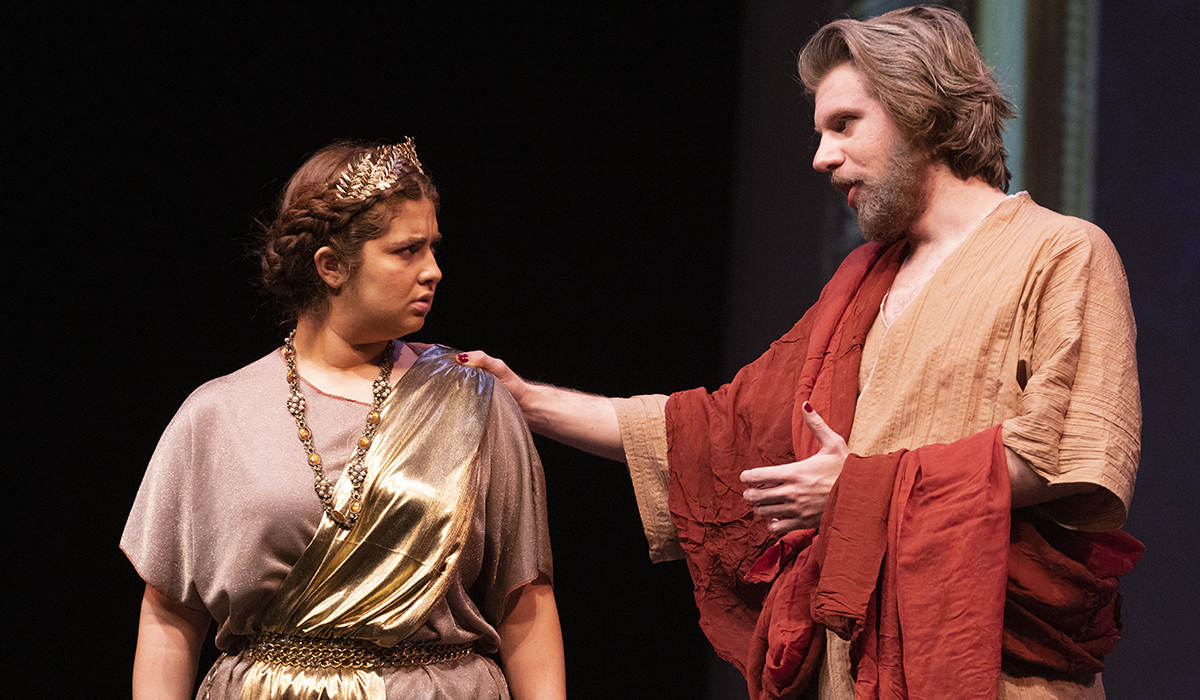Treachery, greed fuel early opera ’L’incoronazione di Poppea’
Two chances to see Binghamton University production

A new staging of the opera L’incoronazione di Poppea, or The Coronation of Poppea, is set to debut this weekend at the Anderson Center’s Chamber Hall. Leading the Binghamton University production are music director Julius Abrahams and stage director David Carl Toulson ’97.
Based loosely on the life of Emperor Nero (referred to as Emperor Nerone in the text), the opera follows the relationship between him and his mistress, Poppea. As Nerone attempts to raise the ambitious Poppea to be his empress, he repudiates the current empress Ottavia. The adulterous couple reigns supreme at the end of the opera, when Poppea is made empress and Ottavia is exiled from Rome.
The 1643 opera by Claudio Monteverdi is hailed as the first to base its plot on real historical conflicts and debuted when the genre was only a few decades old. Frequently referred to as a story where “virtue is punished and greed rewarded,” Poppea goes against the usual morality in literature, and that earns it praise for originality and portrayal of human nature.
“The advantage with operas that are less known is you’re not fighting against preconceived ideas. For example, Carmen is very popular and people come to Carmen wanting to see the version they have in their heads, and might be disappointed when they don’t get it,” said Toulson, a lecturer in the Music Department. “But there are not a lot of audiences that have seen productions of The Coronation of Poppea, so they’re coming in with fresh, hopefully accepting, eyes and ears for our production.”
Apart from its revolutionary storytelling, the musical aspect of L’incoronazione di Poppea also carries its own historical importance. Two versions from Naples and Venice were rediscovered during the late 19th and early 20th centuries, which put the opera back on the map.
“Because this music is written in the stile recitativo [a style of vocal music between speaking and singing], there’s no real set way to sing their lines,” said Abrahams, also a lecturer in the Music Department. “The singers have to organically find it in themselves how to deliver the music, as opposed to someone saying, ’This is how the music is going to go.’ It gives the singers the responsibility to be independent and be in charge of the music.”
There will be two casts for the two performing nights, presenting more opportunities for student singers. The demanding nature of the recitative style, where all the lyrics are different without repetition, also demands this.
Emma Bennett, one of the two Poppeas, shared how she gets into the role: “Unlike our opera last year [The Magic Flute], which was a fairytale with a clear hero and a clear villain, everyone is three-dimensional in this. Poppea might seem like the villain, but I’m not supposed to paint her that way.”
“Because it’s the first opera that was about real people, I started by researching Poppea’s actual life. Then I dove into [the opera’s text] for what was said about Poppea in the opera and what she thinks about herself. I formed a personality from that.”
Playing Emperor Nerone is Alexander Bonner, whose skills are put to the test by the role.
“The challenge is not vocally. With early music, there’s not as much of a safety net, such as a thick orchestration underneath you, so it’s really challenging my musicianship skills,” Bonner said. “I’m not somebody who struggles to memorize music, but this has been a real task to get into my brain and into my body.”
This production also takes advantage of projection-based scenery, which saves resources, instead of building set pieces and then tearing them down after the show.
“[Projection-based scenery] gives us flexibility, especially in this opera when there are 34 scenes,” Toulson said. “It really allows us to be very creative in our storytelling as far as what worlds we can create.”
